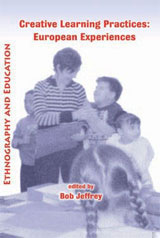|
 |
This book results from The Creative Learning and Student’s Perspectives (CLASP) research project which examined processes of creative learning. Nine research groups throughout Europe explored creative learning practices in a variety of different educational contexts.
The research observed teachers across the cultures constructing real and critical events, incorporating external collaborations, being innovative with space and modeling their own creativity for students. Secondly, it identified some characteristics of creative learning itself, e.g. intellectual enquiry, engaged productivity and process and product reviews. Thirdly, the research demonstrated how teacher strategies and creative learning became meaningful to students with the students gaining self affirmation, developing social identities and appreciating being given a social role in pedagogic evaluation.
The book details the research in Austria, Denmark, England, Ireland, Poland, Portugal, Scotland, Spain and Sweden.
Topics which are highlighted include:
- How the use of the outside environment engaged learners;
- The radical use of new technologies to engage with other cultures;
- How specialist programmes galvanized teacher and student creativity in performativity cultures;
- The development of positive relations and meaningful educational identities for students on the fringes of education;
- How graduate students negotiated pedagogic changes in practice with lecturers;
- How community projects organized by students engaged commitment;
- The extent to which good second language learning involves creative inputs;
- How control over curriculum can be given to very young children; and
- How even when flexibility is a policy imperative class differences in access to the curriculum are difficult to overcome.
- The varied examples in this book should inspire teachers and practitioners and act as a force for good in the development of creative learning across cultures.
Contents
- International background
- The CLASP Project
- Partner policy contexts
- Edited collection themes
- Creative learning in an infant school; Félix Angulo Rasco; José Betanzo Sánchez; Ángeles Córdoba Arana; Eulalia García Cruz; Eulogio García Vallinas; Mónica López Gil; José Ojeda Díaz; Ramón Porras Vallejo; Carmen Pilar Rodríguez González; Raquel Rodríguez Romero; Rosa Vázquez Recio and Rocí Villanego Chaza
- The Bridge School: Creative learning as community learning; Andrea Raggl
- Creative learning and possibility thinking; Bob Jeffrey and Anna Craft
- Bilingual learners’ perspectives on school and society in Scotland; Geri Smyth
- Structure and agency in the construction of creative teaching and learning: A view from the margins; Ciaran Sugrue
- New learning strategies in the upper secondary school: The Danish fieldwork in IT classes; Karen Borgnakke
- Is there an environment for the development of creativity in the project area of the basic education curriculum in Portugal? Maria Odete Valente and Lucília Campos
- Policies of creativity and practices of opposition: The social construction of student preferences for creativity in different forms of school-work within school classrooms; Dennis Beach
- Creativity in the Polish context: Ethnographic researches of the CLASP project; Renata Figlewicz, Dorota Wodnicka and Pawel Ciolkiewicz
Bob Jeffrey, Research Fellow, Faculty of Education and Language Studies, Open University.
|
|
|